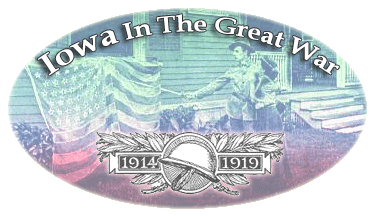| |
West Union Argo-Gazette
West
Union, Fayette Co, Iowa
Wednesday, 04 December 1918
Page
3 column two |
WHITMORE IN SIBERIA
-------------------
West
Union Man With Detachment of American Forces
Which Takes
Control of Coal Mines
------------------- |
The following letter from Capt. F. B. Whitmore, of Monrovia,
Calif., formerly of West Union, written from Siberia, where he went
with the American Expeditionary force, is reprinted from the Monrovia
Messenger:
"Sept. 10, Vladivostok, Siberia: I am located for
the present in the cantonment hospital, a cement covered brick
building, built by the Russians only a short time ago, so in good
shape. The water supply is poor and electric lights on a circuit that
goes out when it take a notion, but these things can be remedied.
Vladivostok reminds me so much of the seaport cities in China, a native
city becoming modernized, splendid buildings being put up, roads
graded, modern improvements added, but retaining all the vices of the
native and adding all the foreign.
The Americans are the best
men coming in, but so little effort is being made to curb them that the
usual result will happen, as the Americans are so full of energy that
they simply must do something.
Our organizations made at home
and for which we have been training so long, are all being broken up so
probably no two who came from Camp Fremont will be together.
Sept. 11 We have just received orders to go up the railroad to guard
some mines, or rather to drive out rebels, control, take possession and
have operated for use of the government railroad. It will be a force
made up of all of us, but under our experienced American colonel every
officer and every man is anxious to go as everyone wants action.
September 14. All villages are largely supported from the large
coal mines we came to take over and manage after traveling on foot or
in coal cars for this long distance. We came to the mines about 9 p.m.
and we were surprised to find a tremendous plant, one town of over
4,000 and several villages: substantial buildings everywhere, electric
lights in houses, mines running night and day and a big business going
on. It was like suddenly coming onto Kuling, a mountain resort in
China, if you had come over the back mountains and didn't expect to
find only a few scattered houses. The people are strongly Bolsheviki,
but our force is strong enough to control the
situation and I
believe most of them will accept the new management. The country is
full of the Chinese bandits called "hung hu dza", whom the people fear
and are glad of our protection. The country around is beautiful, range
after range of wooded hills, the air is bracing, exhilarating and so
far no trouble to speak of. We all go armed all the time, but we think
our force is large enough to prevent or put down any outbreak.
Shu Chian Mines, Siberia, Sept. 18. This is a most interesting people,
really more so than I expected and an American cannot help but
sympathize with them in their struggle for freedom and liberty after so
many centuries of oppression. But the trouble with the Bolsheviki is
that they mistook freedom for license and in their efforts to get
individual freedom they neglected the first principles of government
and their international obligations. There are some 5,000 miners here
in ten mines. They had captured the mines, driven off or killed those
in charge and were running things themselves when we came. The
mountains around are beautiful, almost covered with trees just
beginning to turn red; very few farmers because of unsettled conditions
and danger of robbers. They have to live in villages, so but little
produce comes in to market and foodstuffs are scarce.
The doolies,
truck gardeners, merchants, etc., as usual throughout the east, are
Chinese, the hard workers everywhere. It is always amusing to them that
a white man can talk any Chinese, but they understand, and it makes
friends.
Sept. 20. I am the only medical officer with the
American troops here, so have a great many things to look after. The
poor Russians are as dirty as the Chinese as far as their homes,
closets, and surroundings are concerned, so, to conform with our ideas
of sanitation, a great amount of cleaning up must be done. I like the
Russian people and there seems to be a good feeling for the American
troops. The soldiers are always good mixers and it is fun to see the
soldiers playing with the children although neither understands the
other. The Japanese troops, as usual, are strictly business and always
ready for action.
Shu Chian, Siberia, Oct. 4. This place is a
day and night's ride from Vladivostok. All houses are built with double
windows, thick walls and give evidence of being built to expect severe
weather. But weather so far has been about like northern Minnesota or
Wisconsin -- not much like what we were enjoying last fall in Monrovia.
We are very comfortably situated here, in fact far better than I
had expected to be. I hold clinics here twice a day. A good many have
been sick, but not as many as I had expected. The Japanese doctor in
charge of his troops has been over several times, and we have fun
trying to carry on a conversation with the aid of a dictionary. I wish
he spoke Chinese. All war news we get looks favorable, but I cannot see
that it hastens our mission any yet."
|
|
|

